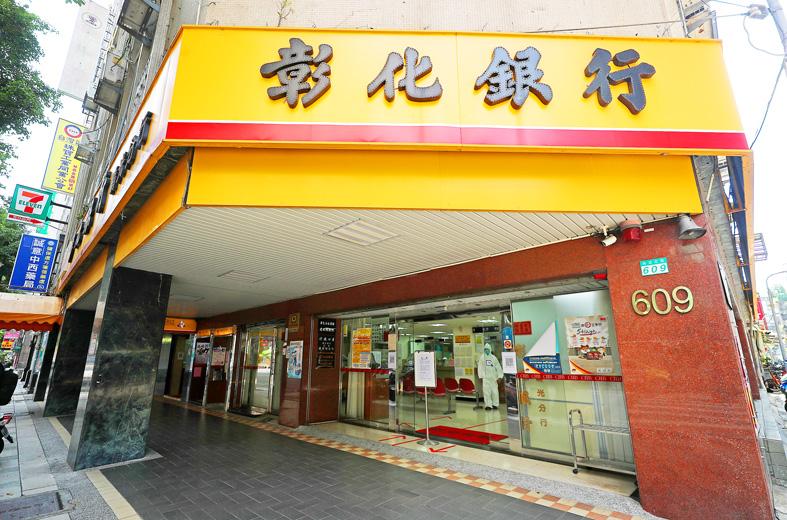State-run Chang Hwa Commercial Bank (彰化銀行) yesterday said it expects profitability to improve in the second half of the year, despite a lackluster showing in the first six months, as growing vaccination rates at home and abroad would make operating conditions more friendly.
The lender stood by its revenue target for this year, although net income for the first six months declined 1.84 percent to NT$4.17 billion (US$150.15 million), narrower than a retreat of 7.5 percent in the first quarter, Chang Hwa Bank spokesman Chen Bin (陳斌) told an online investors’ conference.
Earnings per share rose to NT$0.4, from NT$0.19 at the end of March.

Photo: CNA
The improvement came after the lender stepped up loans to small and medium-sized enterprises, while trimming lending to big corporations and government agencies.
Chang Hwa Bank’s loan-to-deposit ratio edged up to 76.39 percent last quarter, compared with 76.15 percent three months earlier, and should gain strength moving forward, officials said.
Revenue contributions from overseas outlets and offshore banking units stood at 35.1 percent, slowing from 37.5 percent for the whole of last year.
The downtrend might reverse in the second half, as the world further emerges from the COVID-19 pandemic, giving customers and the bank more confidence about doing business, officials said.
Likewise, the domestic market, which has taken a hit from a local COVID-19 outbreak, is expected to recover this or next month, as the number of confirmed cases has dwindled to single digits, while the vaccination rate has steadily increased, officials said.
Fee income shrank 0.32 percent in the first half though sales of wealth management products picked up mildly, officials said.
Net interest margin gained 3 basis points from the previous quarter to 0.89 percent, while the lending spread widened to 1.18 percent.
Chang Hwa Bank said it would raise its holdings of local shares during price corrections, guided by the principle of stability in dealing with investment funds.

Intel Corp chief executive officer Lip-Bu Tan (陳立武) is expected to meet with Taiwanese suppliers next month in conjunction with the opening of the Computex Taipei trade show, supply chain sources said on Monday. The visit, the first for Tan to Taiwan since assuming his new post last month, would be aimed at enhancing Intel’s ties with suppliers in Taiwan as he attempts to help turn around the struggling US chipmaker, the sources said. Tan is to hold a banquet to celebrate Intel’s 40-year presence in Taiwan before Computex opens on May 20 and invite dozens of Taiwanese suppliers to exchange views

Application-specific integrated circuit designer Faraday Technology Corp (智原) yesterday said that although revenue this quarter would decline 30 percent from last quarter, it retained its full-year forecast of revenue growth of 100 percent. The company attributed the quarterly drop to a slowdown in customers’ production of chips using Faraday’s advanced packaging technology. The company is still confident about its revenue growth this year, given its strong “design-win” — or the projects it won to help customers design their chips, Faraday president Steve Wang (王國雍) told an online earnings conference. “The design-win this year is better than we expected. We believe we will win

Chizuko Kimura has become the first female sushi chef in the world to win a Michelin star, fulfilling a promise she made to her dying husband to continue his legacy. The 54-year-old Japanese chef regained the Michelin star her late husband, Shunei Kimura, won three years ago for their Sushi Shunei restaurant in Paris. For Shunei Kimura, the star was a dream come true. However, the joy was short-lived. He died from cancer just three months later in June 2022. He was 65. The following year, the restaurant in the heart of Montmartre lost its star rating. Chizuko Kimura insisted that the new star is still down

While China’s leaders use their economic and political might to fight US President Donald Trump’s trade war “to the end,” its army of social media soldiers are embarking on a more humorous campaign online. Trump’s tariff blitz has seen Washington and Beijing impose eye-watering duties on imports from the other, fanning a standoff between the economic superpowers that has sparked global recession fears and sent markets into a tailspin. Trump says his policy is a response to years of being “ripped off” by other countries and aims to bring manufacturing to the US, forcing companies to employ US workers. However, China’s online warriors